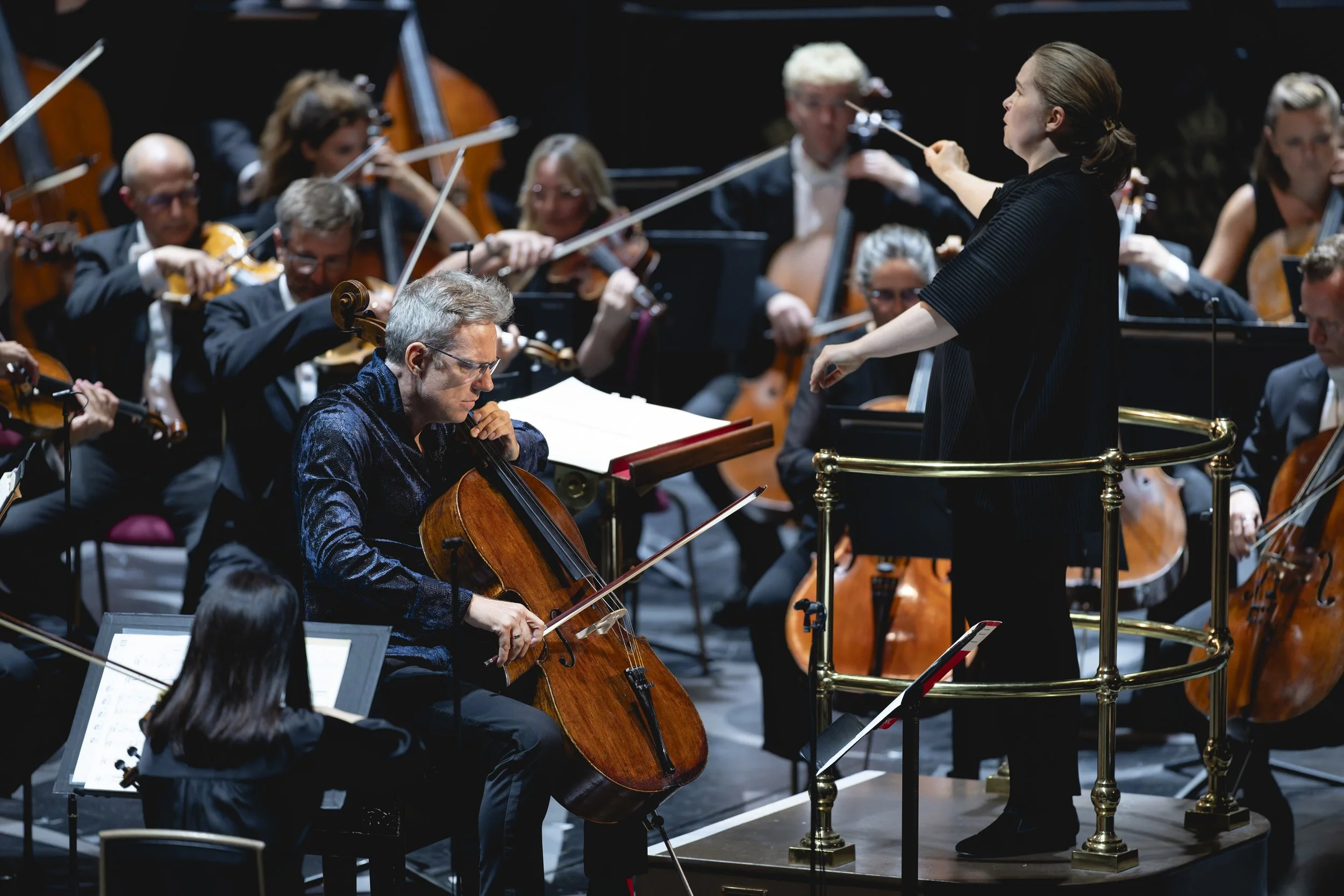Before we fall (cello concerto)
Duration 26 min.
Orchestra instrumentation: 2+afl.ca.2+bcl.2+cbn / 4.0.2.1 / 2 perc / str
Commissioned by the San Francisco Symphony, BBC Proms, Iceland Symphony, Helsinki Philharmonic, and Odense Symphony
The world premiere took place in May 2025, with Johannes Moser, San Francisco Symphony and Dalia Stasevska
The European premiere took place at the BBC Proms on August 13 2025 with Johannes Moser, BBC Symphony Orchestra, and Eva Ollikainen
Listen to the European/UK premiere via Minnesota Public Radio (starts at min 7:23)
Listen to the Iceland premiere via Icelandic national radio (starts at min 16:35) - Johannes Moser, Iceland Symphony Orchestra, & Eva Ollikainen
Selected reviews:
“A volcanic new concerto ... Johannes Moser gave its UK premiere at the Royal Albert Hall, acting as a fearless guide on a tense and compelling half-hour journey through an epic, sombre orchestral soundscape ... in some ways [Thorvaldsdottir] echoes the form’s traditions — there’s an expressive central section (a moving lament) and a virtuosic cadenza — yet pushes into new worlds.” - Rebecca Franks, The Times
“[Before we fall] has one instantly thinking of mighty, ancient, craggily dark-hued and mist-covered terrain through which the cellist alternately wanders and rushes, sometimes at one with it, sometimes in battle. Johannes Moser and the [BBC Symphony Orchestra] were thoroughly at one with each other and the music ... as the subsequent applause thundered away – with Thorvaldsdottir herself now also onstage – there seemed little doubt that a formidable new concerto had landed.” - Charlotte Gardner, Bachtrack
“There is both radiance and darkness to Thorvaldsdottir’s score ... This is an extraordinary piece, one of the most significant premieres at the BBC Proms ... Moser’s performance was a tour de force backed by supreme confidence by the BBC Symphony Orchestra under Ollikainen.” - Colin Clarke, Seen and Heard International
“[A]n eclectic evening of masterpieces ... In a programme that moved from Varèse’s tightly coiled modernism to Stravinsky’s pagan cataclysm via a hypnotic dose of Ravel, the centrepiece was the UK premiere of Anna Thorvaldsdottir’s Before We Fall – a work whose soundworld lingers long after the final note fades.” - Keith McDonnell, musicOMH
“Anna Thorvaldsdottir’s Before We Fall began with a splash of cymbal and a tutti chord that disintegrated rapidly into tapping and sliding out of which soloist Johannes Moser soared, all generous vibrato and lyrical warmth … the concerto has an elemental, immersive quality, its symphonic textures seeming at times to breathe as if a living organism. ... Occasionally, the entire ensemble clicked briefly into tonal harmony – a remarkable, luminous effect.” - Flora Willson, The Guardian
“Thorvaldsdottir’s new cello concerto, “Before We Fall,” is a banger, sonically and intellectually … Moser played throughout with both thrilling splendor and fierce intimacy. … Thorvaldsdottir’s sound world, both delicate and massive, is like no other ... in Stasevska’s hands, [it] induced a trancelike sense of being outside of time.” - Lisa Hirsch, San Francisco Chronicle
Program notes:
The core inspiration behind the cello concerto Before we fall centres around the notion of teetering on the edge, of balancing on the verge of a multitude of opposites. The musical structure flows between lyricism and a sense of distorted energy — two main forces that stabilise this entropic pull. Driven by the strong sense of lyricism that permeates the piece, the work also orbits a forward-moving energy that connects and balances the opposites in different ways. The stable fundament - a grounding power of sustained harmonic presence - communicates with ethereal and distorted sounds, together providing the earth for the essence of the solo cello, the structure upon which it stands and within which it moves. The cello, both alone and deeply connected to the orchestral elements in its expression, generates the atmospheric progression of the world it inhabits, yet continuously on the verge of falling outside the reality it is building for itself.
As with my music generally, the inspiration is not something I am trying to describe through the music or what the music is “about”, as such. Inspiration is a way to intuitively tap into parts of the core energy, structure, atmosphere and material of the music I am writing each time. It is a fuel for the musical ideas to come into existence, a tool to approach and work with the fundamental materials, the ideas and sensations, that provide and generate the initial spark to the music – the various sources of inspiration are ultimately effective because I perceive qualities in them that I find musically captivating. I do often spend quite a bit of time finding ways to articulate some of the important elements of the musical ideas or thoughts that play certain key roles in the origin of each piece but the music itself does not emerge from a verbal place, it emerges as a stream of consciousness that flows, is felt, sensed, shaped and then crafted. So inspiration is a part of the origin story of a piece, but in the end the music stands on its own.



